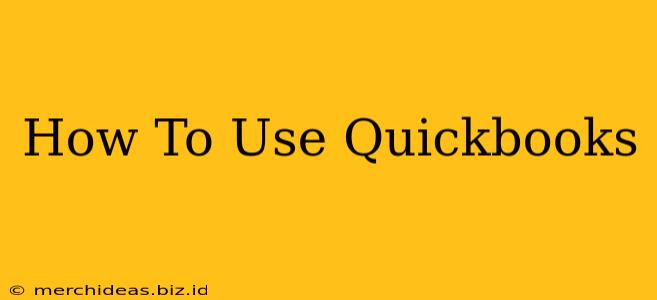QuickBooks, a leading accounting software, simplifies financial management for businesses of all sizes. This comprehensive guide will walk you through the essentials of using QuickBooks, from initial setup to generating reports. Whether you're a freelancer, small business owner, or accountant, understanding QuickBooks is crucial for efficient financial management.
Getting Started with QuickBooks
Before diving into the specifics, let's cover the initial steps. Choosing the right QuickBooks plan is crucial. Intuit offers several options, including QuickBooks Online, QuickBooks Self-Employed, and QuickBooks Desktop. Consider your business needs and budget when making your selection. Each plan offers varying features and levels of support.
Setting up Your QuickBooks Account
Once you've chosen a plan and signed up, the setup process is relatively straightforward. You'll need to provide information about your business, including your company name, address, and tax information. Accuracy here is paramount for accurate financial reporting. Take your time and double-check everything.
- Chart of Accounts: This is the foundation of your QuickBooks system. It lists all your accounts, including assets, liabilities, equity, revenue, and expenses. Understanding this is critical for organizing your financial data.
- Adding Customers and Vendors: Inputting your customer and vendor information early ensures smooth invoicing and expense tracking. Be consistent in recording their details to avoid errors later on.
- Bank and Credit Card Connections: Linking your bank and credit card accounts allows for automatic syncing of transactions, saving you significant time and effort. This is a game-changer for efficient bookkeeping.
Mastering QuickBooks Essentials: Invoicing & Expense Tracking
Now that your account is set up, let's explore the core functionalities.
Creating and Sending Invoices
QuickBooks simplifies invoicing. You can create professional-looking invoices with ease, including item descriptions, quantities, tax rates, and payment terms. Customize your invoices to match your brand for a professional touch. Remember to send invoices promptly to ensure timely payments.
- Tracking Payments: QuickBooks automatically tracks payments received, providing you with an up-to-date view of your outstanding invoices.
- Recurring Invoices: For recurring services, set up recurring invoices to automate the process, saving time and reducing errors.
Tracking Expenses and Receipts
Accurate expense tracking is essential for tax preparation and financial analysis. QuickBooks allows you to easily record expenses, categorize them, and attach receipts for future reference. Using the mobile app enhances on-the-go expense management.
- Expense Categorization: Properly categorizing expenses is key for generating accurate financial reports. Using a consistent system avoids confusion.
- Receipt Management: Attaching digital receipts simplifies record-keeping and reduces the need for physical filing.
Utilizing QuickBooks Reporting Features
QuickBooks' reporting capabilities provide invaluable insights into your business's financial health.
Generating Reports
QuickBooks offers a wide range of reports, including profit and loss statements, balance sheets, cash flow statements, and more. These reports are crucial for making informed business decisions and monitoring your financial progress. Regularly reviewing these reports is a vital habit.
- Customizing Reports: Tailor reports to your specific needs by selecting specific date ranges, accounts, or other criteria.
- Report Analysis: Understand the information presented in your reports. This is key for effective financial management.
Advanced QuickBooks Features (Brief Overview)
While this guide covers the basics, QuickBooks offers numerous advanced features, including:
- Inventory Management: For businesses with inventory, this feature tracks stock levels and helps manage purchasing.
- Payroll: QuickBooks Payroll simplifies payroll processing, including tax calculations and payments.
- Project Management: Track time spent on projects and associated costs.
Conclusion: Embrace QuickBooks for Efficient Financial Management
Mastering QuickBooks significantly enhances your financial management. By utilizing its core features, you can streamline your bookkeeping, generate accurate reports, and make better-informed business decisions. Remember, consistent use and attention to detail are key to reaping the full benefits of QuickBooks. Don't hesitate to explore the many resources available online, including Intuit's official support website and numerous tutorials, to further your QuickBooks expertise.
